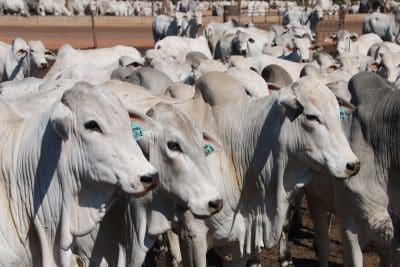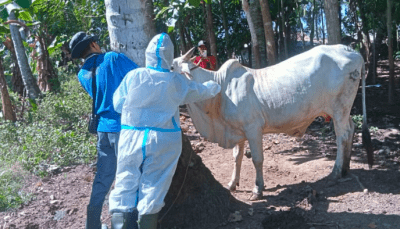WITH foot-and-mouth-disease now endemic in Indonesia following last year’s outbreak, more reports are emerging that Jakarta may soon open its market to shipments of cattle from Brazil – but whether such a trade would be viable long-term remains doubtful.
Indonesia currently relies on Australia as its sole source of feeder cattle, importing around 500,000 to one million cattle per year over the past decade.
Indonesian Government representatives have never tried to hide their desire to reduce Indonesia’s reliance on Australia for beef and live cattle, ever since it was suddenly left without supply in the lead up to Ramadan following the Gillard Government’s snap decision to suspend all exports of Australian cattle to Indonesia after footage showed some abattoirs mistreating cattle in 2011.
The high Australian cattle prices of recent years, fuelled by basic supply and demand fundamentals and an historically low shortage of cattle in Australia, has only exacerbated Indonesia’s desire to find and expand alternative sources to Australian cattle in recent years.
Indonesia has opened its market to imports of frozen boxed buffalo and beef from India and Brazil despite both countries having FMD issues.
In the past few years Government representatives from Brazil and Mexico have been working hard to woo the Indonesian Government to open its gates to their live cattle.
Concerns about both countries’ exposure to FMD did not help their case.
However, with FMD now also endemic in Indonesia, a primary barrier to taking their cattle has now been removed.
One other major barrier remains though and has not changed.
That is the high cost of freighting cattle for three to four weeks from Brazil or Mexico to Indonesia, compared to the short three or four day hop across from northern Australia.
When Australian cattle prices stood much higher six months ago, the comparatively cheaper cost of Brazilian cattle may have been more conducive to a viable trade, but the recent drop in Australian cattle prices form over $5/kg ex Darwin to $3.80/kg will not have aided the economics of the Brazilian/Mexican case.
Last week some Indonesian cattle importers told the Australian Financial Review that Australia’s “monopoly on live cattle exports to Indonesia is coming to an end”, and they expect Brazil to get the green light now FMD is considered endemic in Indonesia.
“All the necessary regulations have been prepared, and the legal framework is almost finalised. I don’t think it will be too long before we are importing cattle from Brazil,” Didek Purwanto, chairman of the joint council of Indonesian Beef Farmers, said, according to the AFR.
Trial maybe, long-term trade unlikely
Contacts with close knowledge of the Indonesia cattle industry and import trade have told Beef Central in recent days they would not be surprised to see one or a small number of trial shipments from Brazil take place soon.
However, they believe the economics is not likely to support longer term shipments and pose a significant threat to Australia’s existing trade.
One advantage Brazilian exporters do have is a Government that is eager to do business and which does not impose the same level of animal welfare assurance regulations on the trade as Australia does, which adds to the cost of Australian cattle arriving in Indonesia.
Indonesian politicians have been promising to reduce meat prices in the lead up to next year’s elections, which would also support the introduction of shipments to show work is being done to proactively expand the country’s supply options.
Djoni Liano, executive director of Indonesian Beef Farmers, told the AFR the Indonesian Govenrment is already “intensively harmonising Indonesia-Brazil regulations”, adding that “hopefully in the near future a business deal will be realised between the private sectors in the two countries for breeding cattle”.
But very high cost of fuel and long distance sea freight are not likely to make the trade viable past a single or small number trial shipments, Beef Central’s sources believed.
One commented that the concept may have been ‘marginally competitive’ when Australian cattle were prices above $5/kg ex Darwin last year, but would be unlikely to be viable at current price of $3.80/kg today.
Indonesian cattle importers who spoke to the AFR said that while Australian cattle are priced at around $US3 per kilogram, Brazilian cattle are priced between $US2.80 and $US2.70 – a differential that would not offset the substantial sea freight costs involved of shipping cattle from Brazil to Indonesia.
A trial shipment of cattle was delivered from Brazil to Vietnam in 2021, but despite reports that would be the start of a larger ongoing trade, no further shipments have yet followed.



I’m a live export stockman an have done 100,s of voyages to Indonesia an many other countries some from South America to China. The freight costs and the mortality rates would be way too expensive. for Indonesian to export from South America. So our big farms from the top end would not have to worry too much. We have a good market in Vietnam at the moment.
April 27 a Brazilian court banned the export of live cattle from all Brazilian ports over animal welfare concerns. The ruling will be subject to appeal but long haul shipment to Indonesia may face problems within Brazil.
Talk about an own goal … Goal of the century!
Indeed Dick, many of us still have a clear memory of the actions and activities of the 1997/98 and onward for two years during the Asian Financial Crisis.
Sorry! Cannot pay, “the price, the price”. Something the Brazilians had better steel themselves for, if they succeed beyond the glossy pamphlets of year 2000.
Good comment. Can you expand ?